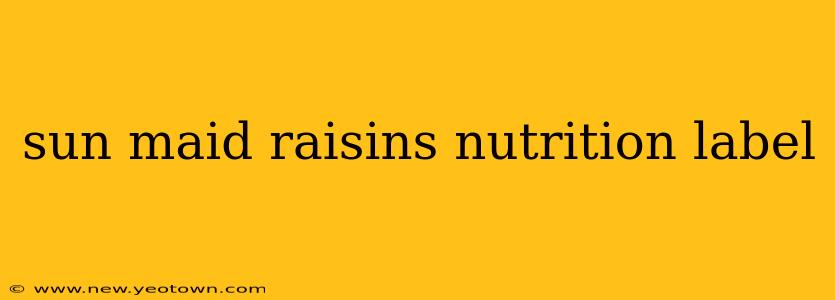Raisins. Those tiny, wrinkled bundles of sweetness hold a surprising amount of nutritional complexity. For many, the instantly recognizable Sun-Maid brand is synonymous with this delicious dried fruit. But have you ever really looked at the nutrition label? Let's delve into the sweet details, uncovering what's inside that seemingly simple package and answering some common questions.
Imagine a sun-drenched California vineyard, where plump, juicy grapes hang heavy on the vine. These grapes, harvested at their peak ripeness, embark on a journey of transformation – becoming the sweet, chewy raisins we all know and love. But beyond the delightful taste, lies a nutritional profile that's worth exploring.
What are the main ingredients in Sun-Maid Raisins?
The primary ingredient, and indeed the only ingredient listed on most Sun-Maid raisin packages, is simply: raisins. This highlights the brand's focus on using only natural ingredients with minimal processing. However, it’s crucial to remember that the nutritional content can slightly vary depending on the specific type of raisin (e.g., golden raisins versus regular raisins) and the growing conditions.
How many calories are in a serving of Sun-Maid Raisins?
A typical serving size of Sun-Maid raisins, usually around 1/4 cup (approximately 40 grams), generally contains around 120-130 calories. This calorie count is relatively moderate for a snack, especially considering the abundance of natural sugars. But it's important to practice portion control, as exceeding recommended serving sizes can quickly increase calorie intake.
What are the nutritional benefits of Sun-Maid raisins?
Sun-Maid raisins aren’t just a delicious snack; they offer a surprising array of health benefits. They’re a good source of:
- Fiber: Raisins are a good source of dietary fiber, promoting healthy digestion and helping to regulate blood sugar levels.
- Potassium: Essential for maintaining healthy blood pressure.
- Iron: Important for red blood cell production and preventing anemia.
- Antioxidants: Raisins contain various antioxidants that help protect your body against cell damage.
Remember though, that while raisins offer these benefits, they are also naturally high in sugar. Moderation is key.
Are Sun-Maid raisins a good source of protein?
While not a primary source of protein, Sun-Maid raisins do contain a small amount of protein. It's not a significant amount compared to other protein sources, however, it still contributes to your overall daily intake.
Are Sun-Maid raisins gluten-free?
Yes, Sun-Maid raisins are naturally gluten-free. This makes them a safe and delicious snack for individuals with celiac disease or gluten intolerance. Always check the label to ensure there hasn't been any cross-contamination during processing, especially if you have severe allergies.
What are the potential downsides of eating too many Sun-Maid raisins?
While raisins offer numerous benefits, consuming excessive quantities can lead to some drawbacks:
- High Sugar Content: The high sugar content can contribute to weight gain and increase the risk of dental problems if not brushed properly.
- Dried Fruit Effect: Raisins have a high concentration of sugar, which can cause digestive upset in some individuals if consumed in large amounts.
- Sugar Alcohol Content: Certain types of raisins might contain added sugar alcohols, which can cause gas and bloating for some people. Check the ingredient list to verify this.
Conclusion: The Sweet Truth about Sun-Maid Raisins
Sun-Maid raisins offer a convenient and delicious way to incorporate natural sweetness and several essential nutrients into your diet. By understanding the nutritional information provided on the label and practicing mindful portion control, you can enjoy these delightful treats as part of a balanced and healthy lifestyle. Remember that moderation is key – savor the sweetness without overindulging!

